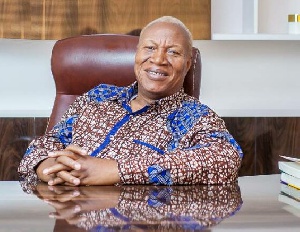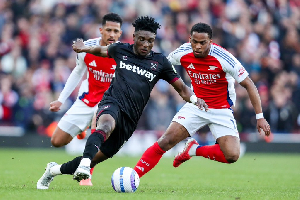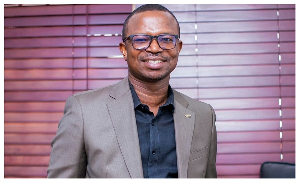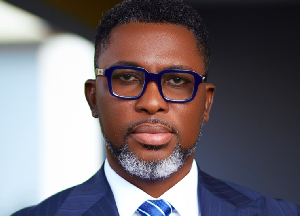Former Vice Chancellor of University of Professional Studies, Accra, Prof. Joshua Alabi has called on President Akufo-Addo to review the Ghana-US military cooperation agreement.
According to him, it will be a sign of disrespect, insensitive and dishonouring attitude of a President towards his citizens if he decides deliberately to turn deaf ears to the call.
In a statement copied to GhanaWeb, the Flagbearer hopeful of the opposition National Democratic Congress (NDC) states that Paragraph 3 of the preamble of the Ghana-United States Military agreement recognizes that “such cooperation is based on full respect for the sovereignty of each Party.”
But this Prof Alabi believes contradicts article 3 of the same agreement, which demands that “Ghana shall accord to (US) military personnel and civilian personnel, the privileges, exemptions, and immunities equivalent to those accorded to the administrative and technical staff of a diplomatic mission under the Vienna Convention on Diplomatic Relations of April 18, 1961”.
Read the full statement below
Press Statement by PROF JOSHUA ALABI on the Ghana-US Military Cooperation Saga
I would like to add my voice to the current discussion concerning the Ghana-United States military cooperation agreement which has occupied our minds as well as our body politic for a few weeks now.
I believe that the concerns about this issue are so critical that it is imperative to tackle it head-on in order to nip a potential crisis in the bud, and to allow peace to prevail. In the heat of the ongoing political tensions in the country marred by entrenched positions, the victim becomes the state, and the most impacted are the citizens whose prime interests we want to protect. Very often, in cases such as this, no one wins, and everyone loses. We have a nation’s reputation to protect; we have peace to safeguard and we have the interest of citizens to guard jealously.
For these reasons, I wish to rise above the emotion of the current discussion in an attempt to prevail on the conscience of all parties concerned with the Ghana-US Military cooperation saga, in the hope that a solution would be found, which would safeguard the mutual respect existing between our country Ghana and the United States, so as to rest the hearts and minds of Ghanaians on this matter once and for all.
In this regard, I would like to preface my discussion by underscoring the fundamental truth that we Ghanaians are a peaceful people. We are a decent society. We are so welcoming to the extent that our brand- ‘the Ghanaian hospitality’- is one that is admired and cherished globally. The reaction of Ghanaians to the recent event is therefore not to be misconstrued as an antagonizing attitude towards the United States. Far from it! Ghanaians hold the United States in utmost respect. But it is our democratic right, and indeed a national responsibility, to defend and protect the dignity and sovereignty of our country, just as it is for the American people to defend theirs.
Indeed, Ghana’s relation with the United States dates back centuries, including the most painful history of slavery. The United States established diplomatic relations with Ghana in 1957 following Ghana's independence. In 1961, Ghana hosted the first cohort of Peace Corps Volunteers to serve overseas and currently hosts 160 volunteers. The United States and Ghana share a history promoting democracy, human rights, and the rule of law.
There are approximately 235,000 Ghanaian immigrants in the United States, including citizens who are serving in the US military and other public services (source: Migration Policy Institute, RAD Profile, 2015). And several Ghanaians have been trained in United States Universities including our very first President Osagyefo Dr. Kwame Nkrumah.
United States development assistance to Ghana implemented by the U.S. Agency for International Development (USAID), includes the Millennium Challenge Corporation (MCC), and others. The USAID-managed development assistance to Ghana has supported Ghana in improving the power sector, increasing food security, enhancing basic health care, increasing access to quality basic education, and strengthening local governance to benefit all Ghanaians. Currently, the jointly established West Africa Trade Hub, located in Accra, provides technical assistance to help small businesses to grow and access new customers in the United States and the West African region. The Peace Corps has a large program in Ghana, with volunteers working in education, agriculture, and health (including HIV/AIDS, malaria, sanitation, and nutrition)-(source: US state department; Ministry of Finance-Ghana; Ministry of Foreign Affairs-Ghana; USAID).
On the issue of Military Cooperation, the United States and Ghana have worked together on various defence and law enforcement issues. Ghana and the United States militaries cooperate in numerous joint training exercises through the U.S. Africa Command. The United States and Ghana have a bilateral International Military Education and Training program, a Foreign Military Financing program, and numerous humanitarian affairs projects, including a relationship between the government of Ghana and the North Dakota National Guard under the auspices of the U.S. Department of Defence State Partnership Program. Ghana continues to participate in the African Contingency Operations Training and Assistance program, in which the United States facilitates the development of an interoperable peacekeeping capacity among African nations. Ghana is a partner country for the African Peacekeeping Rapid Response Partnership and the Security Governance Initiative. These programs seek to address security sector governance challenges in Ghana and enhance Ghana’s ability to rapidly deploy peacekeepers. Ghana is also a priority country for efforts to address transnational organized crime in West Africa. The Department of State’s Bureau of International Narcotics and Law Enforcement Affairs (INL) has worked with Ghana government so far to: 1) build capacity for complex criminal investigations and case packages on transnational organized crimes including financial crimes, drug trafficking, and human trafficking incidents; 2) conduct fair trials of transnational criminals and drug traffickers, and 3) combat rising drug abuse in West Africa.
As we can see, Ghana-United States diplomatic cooperation is very strong. It is therefore interesting that the recent Ghana-United States Military agreement will spark off such uproar when the two countries have previously enjoyed this relation over decades. This begs the key question: why now? Why are citizens raising eyebrows? A careful examination of the current agreement (2018) raises the following concerns: how much advantage is the United States wanting to take of Ghana? How much of Ghana’s sovereign rights are under threat and could be trampled upon? Is the agreement negotiated from a position of equal footing, safeguarding the supreme sovereign interests of both countries? Let me underscore my points with just two examples below:
Paragraph 3 of the preamble of the Ghana-United States Military agreement recognizes that “such cooperation is based on full respect for the sovereignty of each Party;” but this provision seems to be contradicted by article 3 of the same agreement, which demands that “Ghana shall accord to (US) military personnel and civilian personnel, the privileges, exemptions, and immunities equivalent to those accorded to the administrative and technical staff of a diplomatic mission under the Vienna Convention on Diplomatic Relations of April 18, 1961”.
How can the preamble state that we are a sovereign state but accord American military personnel the privileges and exemptions reserved for diplomats for military reasons on our territory? Can the United States guarantee according to the same privileges to Ghana military personnel should this be required in the future for similar reasons?
Similarly, Article 15 posits United States’ sovereignty over Ghana’s. The article states: “claims by third parties for damages or losses caused by military personnel and civilian personnel shall be resolved by the United States Government in accordance with United States laws and regulations”.
This aptly makes our nationals helpless and also place them at the mercy of the United States government when a US officer commits an offence in Ghana. This cannot be right.
Truly, the current agreement as it stands, neither meets the approval of the majority of Ghanaians nor serves our national interest. More importantly, Ghana should be the last country in Africa to sign such an agreement which undermines our African-ness and sovereign interests. Historically, Ghana has a Pan-Africanist orientation. It is also a role model for the Africa Union. Our Independence movement was resolutely linked with liberation movements across Africa. Our first President, Osagyefo Dr Kwame Nkrumah played a crucial role in building continental Africa, and he is still seen as a shining example of African thought leadership. Thus, with the stature that Ghana wields in international affairs and the ‘symbol’ that we represent the world for people of African descent who look up to us as trailblazers of the struggle for African emancipation, we should have been more cautious about such agreements that seek to erode the sacred nature of who we are as a people.
I, therefore, call on the Government of His Excellency Nana Addo Dankwah Akuffo Addo to heed the call of his citizens by re-engaging with the United States to review the terms of this agreement. This will be a noble gesture and indeed the least we can expect from a leader. I encourage the President to do so in good faith and with a sense of urgency since our understanding is that the implementation of the agreement is imminent. If the President decides deliberately to turn deaf ears to the call for a review of the Ghana-United States Military cooperation agreement, it will smack of a disrespectful, insensitive and dishonouring attitude of a President towards his citizens. It will be unfortunate and will not serve his good interest.
I, therefore, encourage HE President Nana Addo to rise above parochial and partisan interests and do the right thing.
In the same vein, I call on the United States’ diplomatic mission in Ghana to pay attention to the major concerns raised by Ghanaians and advise the government it represents to re-engage our government to address the said concerns. As a world leader that many nations look up to, this is not an example that the United States should set in Africa.
I end by admonishing all Ghanaians to remain vigilant and continue to hold the government accountable on matters relating to the military cooperation agreement. The peaceful protests and advocacy of the last few days should continue. We must continue to hold the feet of our government to the fire of accountability.
While expressing our democratic rights in peaceful protests against the Ghana-United States military cooperation agreement, we should at the same time remind our government that there are more important matters it should be concerned with. Millions of our youth are still unemployed and becoming less hopeful about the future; mothers are dying because of their inability to access maternal health care; parents cannot afford to take their children to school; our communities have become fearful because of wanton spates of armed robbery and lawlessness.
The government should, therefore, rather concentrate on mobilizing our vast national potential for the socio-economic transformation of the country. This is what the masses of the Ghanaian people want.
Long live Ghana!!! And May God bless our homeland Ghana, making it greater and stronger.
By Prof Joshua Alabi
(former Vice-Chancellor, UPSA)

















